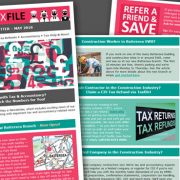Change to permitted VAT return submission methods
 In a vote for common sense, HMRC has finally relaxed its requirements, under certain circumstances, in respect to the methods it allows for submission of VAT returns. Previously almost* all businesses were forced to submit VAT returns on-line while paper and telephone submission methods were phased out forcibly even for those who did not have access to a viable on-line method. We’re pleased to confirm that HMRC are now relaxing submission requirements for those businesses who can show that the on-line method is not a practical one for their particular circumstances, for example based on limitations caused by age, disability, remoteness, quality of internet connection etc. HMRC now requires those unable to file on-line to file by telephone. And if that’s not practical for similar reasons, they may then be able to submit good old-fashioned paper VAT returns. If HMRC decline both methods, the business or individual concerned will be able to appeal if it thinks it has a reasonable reason to do so.
In a vote for common sense, HMRC has finally relaxed its requirements, under certain circumstances, in respect to the methods it allows for submission of VAT returns. Previously almost* all businesses were forced to submit VAT returns on-line while paper and telephone submission methods were phased out forcibly even for those who did not have access to a viable on-line method. We’re pleased to confirm that HMRC are now relaxing submission requirements for those businesses who can show that the on-line method is not a practical one for their particular circumstances, for example based on limitations caused by age, disability, remoteness, quality of internet connection etc. HMRC now requires those unable to file on-line to file by telephone. And if that’s not practical for similar reasons, they may then be able to submit good old-fashioned paper VAT returns. If HMRC decline both methods, the business or individual concerned will be able to appeal if it thinks it has a reasonable reason to do so.
This change of heart follows a tribunal which HMRC lost, following a 2 year legal dispute. The judge found that HMRC were breaching the appellant’s human rights. The other loser was, of course, the taxpayer who will foot the legal and court costs, which run into tens of thousands of pounds. However the overall outcome is a good one in our opinion, particularly for smaller businesses operated by those who may be unable to operate electronic communications or whose internet communications are simply not reliable enough.
Taxfile can help with all your VAT issues, whether registering or de-registering for VAT, helping with VAT returns, answering VAT-related queries, dealing with the VAT office on a client’s behalf, or organising VAT refunds. Our team are available by phone, email, at our offices in Dulwich, Tulse Hill and Exeter or alternatively you can make an appointment on-line.
* The exceptions to this rule were taxpayers whose religious beliefs were incompatible with the use of electronic communications, and businesses who were suffering insolvency.









